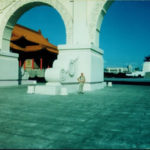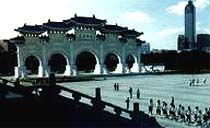
A Proud Example
In recent decades there has hardly been an Asian country that has ‘come out’ more than Taiwan. And the reason? An urgent gay community that’s willing to test the limits of conservative Asian traditions in a country that has embraced democratic principles.
Visible proof of this occurred in September of 2000 as a flutter of events and media attention surrounded the first government sponsored lesbigay street festival. On the day of the fest, the Taipei Times announced:
“A homosexual rights gathering will be held this weekend in Taipei. The Lesbian and Gay Civil Rights Movement, Taipei 2000, will take place today… Performances by a band and dancers will start at 2pm and a number of groups will set up stalls and invite visitors to join the games they have designed… Furthermore, an exhibit will take place at the same location, where historical objects and documents on the history and culture of Taiwan’s homosexuals will be on display.
The news story concluded: “Tomorrow, an international forum on homosexuality will be held at Taipei City Hall. Two US activists for homosexual rights–Michael Bronski and Nan Hunter–will be joined by Taiwanese activists to address the issues of civil rights for homosexuals and development of the homosexual movement.”
CNN seemed impressed too. On the evening of the event they aired coverage of the festival on CNN World Report. Video footage of the scene was accompanied by reporter Jason Blatt’s commentary: “Scenes like these might not be unusual for a gay and lesbian pride festival, but even just a few years ago it would have been unthinkable for the Taipei municipal government to organize such an activity. As it turned out, hundreds of people, including students from five local universities, showed up for the festival. Many said they had long ago stopped trying to conceal their lifestyles. ‘I like just being myself,’ said one man.”
Reporting from the downtown festival location, CNN’s report continued: “Social values tend to be conservative throughout Asia, and Taiwan is no exception. But participants at the festival said there are a lot more gays and lesbians in Taiwan than outsiders might think. The director of an association of gay public schoolteachers says, ‘we have a hundred registered members, but the real number of gay teachers is far higher.
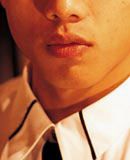 ‘ The TV report ended with these upbeat words: “The festival’s mood could be judged by the enthusiasm of the participants, many of whom could be seen walking around had in hand. But others were shy about appearing on camera. ‘Love is love, no matter what,’ one woman said. Another participant was more empathic when he claimed, ‘marriage isn’t important to me; two people being together is.’
‘ The TV report ended with these upbeat words: “The festival’s mood could be judged by the enthusiasm of the participants, many of whom could be seen walking around had in hand. But others were shy about appearing on camera. ‘Love is love, no matter what,’ one woman said. Another participant was more empathic when he claimed, ‘marriage isn’t important to me; two people being together is.’
” The stories were not major headline news but the rainbow event was distinctly present and was remarkable for two reasons. First, a government which, in the not-too-distant past had imposed repressive martial law across the land now sanctioned the event. It was lifted in 1987. Secondly, the President of Taiwan, Chen Shui-bien, personally received the event’s leaders in his office and offered his support for the gay rights movement. He declared homosexuality was neither a sin nor a sickness and that he would work to the fullest to promote and protect the human rights of gays and lesbians in Taiwan.
Since the Stonewall ‘riots’ in 1969, liberation movements have emerged around the world sporting various festivals, parades and protests in the cause of human gay rights. Since Taiwan is a country that has seen its share of demonstrations on behalf of many causes, one might have expected a forceful gay community to push its agenda at the earliest opportunity. However, for much of the nineties, gay activism was tentative and cautious here as the community sought it own leadership, agenda and ways to gain visibility and dignity.
So this festival and Presidential blessing in 2000 held much symbolic and historic importance to the lesbigay cause in Taiwan, and indeed the world. It is rare, in any country, that highest level politicians are so openly welcoming and supportive of unconditional human rights. Such gestures and words sounded more Scandinavian than Asian.
Veteran activist Michael Bronski said he was optimistic about the future for gays and lesbians in Taiwan. He claimed, “it’s the end of a very long journey for everyone here, but it’s also the beginning of a journey as well. And I can see from here that it’s going to go wonderfully well.” This newly emergent ‘official’ visibility clearly stretched the cultural envelope of this island nation of 22 million.
But then, Taiwan is not a ‘typical’ Asian country. This country is one of the great Asian crossroads of ambition and industry fertilized with democracy. Deals and dealers, cargo and containers, money and merchandise are in constant motion here driven as much by their angst of China as by profit margins. Whatever the motive, this oriental culture is a fast flowing blend of eastern energy and western consumerism. Nevermind that barefooted rice farmers still hand plant their paddies fifteen minutes by train outside Taipei–even the crops do well here in this temperate climate.
Learning to Use Gay Politics
In the Los Angles Times, staffer Henry Chu (of Chinese descent) contributed a thoughtful and upbeat report about the current state of gay affairs in Taiwan. His survey reflected on the new gay life that was opening up in Taiwan over recent years; he also noted some of the inhibitions gays face as they push forward. In the following portions of this story, I have quoted and blended some of Chu’s ideas with mine in order to give an updated view of the scene today.
Writing about this new found gay courage in Taiwan, Chu reported: “Organizing politically has been slower to catch on than establishing social spaces, partly because many gays and lesbians continue to fear public exposure. Taiwan still has no openly gay politicians or famous gay public figures.”
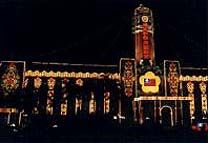 Yet to their credit, fast-learning leaders here got one of their first tastes of political action two years ago, during a close mayoral race in Taipei, the capital. Sensing an opportunity to use their votes as leverage, a handful of activists crafted a statement for the candidates to sign to demonstrate their support for homosexuals.
Yet to their credit, fast-learning leaders here got one of their first tastes of political action two years ago, during a close mayoral race in Taipei, the capital. Sensing an opportunity to use their votes as leverage, a handful of activists crafted a statement for the candidates to sign to demonstrate their support for homosexuals.
The two leading candidates signed the statement and responded to questions put to them by G&L magazine on the issue of gay rights. The incumbent declared: “In the future, I hope that, through the power of the city government, we can help organize gay rights groups with the people and give our gay friends a better environment.”
The opponent won, however, and since then about $33,000 in municipal funds have been earmarked for gay-related programs “That was the first time we knew how to play the gay issue in the political game,” said one of the gay leaders. “If we don’t have our own candidate, then at least we can have our own voice.” The new mayor’s photo has been used to promote the Taiwan Gay and Lesbian Human Rights Association, the first such civic group to seek official approval from the government.
It was also during that same presidential race that gay strategists improved their political savvy by persuading one of the minor candidates to conduct a mock wedding between two women as a way to express support for gay rights. He announced publicly, “whether you’re homosexual, bisexual or heterosexual, you should enjoy equal treatment,” after which the fake brides joined hands and the news cameras whirled. It was a scene unimaginable in any presidential politics–even Holland!
Before 1996: Gay Vacuum
Any one date is imprecise as to the start of this rising gay phoenix. My first experience was in 1996. At that time a huge downtown billboard announced the cinematic arrival of ‘The Birdcage’ which portrayed a gay couple who own a glitzy drag nightclub. The film was not what you would call a typical action thriller, Taiwan’s favorite genre, and definitely not about a topic hot on the lips of most Taiwanese folks.
At that time, the film dropped down, for the most part, into a cultural gay vacuum. Even with the few bars and clubs, occasional gay-theme books at Caves Bookstore and youthful activism (mostly at the University), Taiwan was, and is, highly heterosexual, family-bound and sexually-hushed.
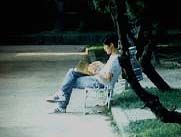 Then and now, when a gay person comes out to a friend or (rarely) to a family member, a common reaction is that they are joking or it’s just a passing phase. He or she is not taken seriously because, for most heterosexuals, there has been little context for understanding same-gender attraction.
Then and now, when a gay person comes out to a friend or (rarely) to a family member, a common reaction is that they are joking or it’s just a passing phase. He or she is not taken seriously because, for most heterosexuals, there has been little context for understanding same-gender attraction.
‘Birdcage’ was science fiction here. Homosexuality has been mostly considered as some western oddity not really a part this Chinese-based culture. Previously–before the present outcropping of gay activism of the late nineties–most Taiwanese knew about homosexuality to the degree that most rural Americans understand Chinese herbal medicine. And where there is no understanding there is no talk.
Finding New Love Among Old Traditions
Despite the strangeness of homosexuality for most Taiwanese, the absence of any real political, physical or legal danger has allowed a ‘gay scene’ to quietly and safely emerge in Taipei, nurtured and inspired by imported western gay imagery and ideas.
During my visit I talked with several gay male couples whose lives bridged this dichotomy of progressive and traditional values. Most of them lived quietly with their feelings when in the presence of family and co-workers, yet after work some donned their dance clothes and hair gel and headed out to the live music and laser lights in the discos.
Michael and Joseph: Committed Youth
Very much in love, these two young men met through a network of friends and talked for hours by phone over the course of a week before they actually met. They liked what they saw and heard as they continued face to face for several months. Now, almost year later, they declare themselves as a dating couple although they don’t live together yet.
Michael, 31, shares an apartment with two other roommates (who are not gay) and Joseph, 33, lives with his sister and her husband and their child in the suburbs of Taipei. They both work in the city. Michael has an MBA from George Washington University (USA) in public relations and is employed by a corporation in central Taipei. Joseph is a display designer for a department store and has also visited the U.S. In their off-hours, their clothing is fashionably casual: jeans and dress shirts. Michael wears wire-rimmed glasses and suspenders while Joseph looks smart in a sport coat and sports wavy black hair.
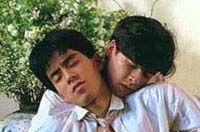 Their relationship is sandwiched between busy work schedules and giving attention to family and straight friends so as not to arouse suspicion they are dating. Neither family knows they are gay and they have no intention of telling them yet, although Michael says he will not lie if he is asked. Joseph said he would not come out to his family if asked.
Their relationship is sandwiched between busy work schedules and giving attention to family and straight friends so as not to arouse suspicion they are dating. Neither family knows they are gay and they have no intention of telling them yet, although Michael says he will not lie if he is asked. Joseph said he would not come out to his family if asked.
Much of Asia is still the domain of suppressed personal expression. Heterosexual family duty is unquestioned and unassailable forcing more than one gay man or woman into a marriage urged by parents. “It’s very hard to go against their wishes. They have no idea about us. We have no support to keep us together,” declared Joseph as he put his hand on his lover’s knee. “In America there is support: you have therapists, groups, other couples. You even have gays who have weddings! (There are registered partnerships in some cities.) But not here. The pressure here is for us to not be together.” There are registered partnerships in some cities. On 24 May 2017, the Constitutional Court ruled that same-sex couples have the right to marry under the constitution and that the Legislature has two years to amend the marriage laws to align with the constitution.
Love has always found a way to survive adverse conditions. Within this straight environment, these two otherwise ‘typical’ guys manage to find freedom, friends and social life. Some of their friends are straight but this doesn’t preclude socializing with them. They can go out with them to eat or to party or go shopping as friends, like any others. No one asks and they don’t tell.
On certain nights, some of the bigger discos have gay night where Taiwanese can meet ‘special’ friends. Here Joseph and Michael can swarm among lesbigay strangers and acquaintances and don’t have to worry about holding hands or kissing. “There no one cares, not even straight couples who go on gay night–they like it better,” Joseph declared with a laugh.
Both of these boyfriends clearly felt the weight of their families but this was insufficient to keep them apart. They saw their future together in Taipei, where more and more people are living as singles. This new living arrangement was helping to reduce the stigma that has long been associated with such status. Modern Taipei life was changing fast and they were happy it was working in their favor.
Social Changes in Taiwan
In recent years social changes have become more progressive, changes that often follow in the footsteps of democracy and prosperity. Most particularly, there was a call for more individual freedom and personal expression. Since martial law was lifted in 1987, Taiwan (also called the Republic of China vs. the mainland Peoples Republic of China), has moved actively to improve the value of human rights. (One of the popular election slogans was “You’re the boss!”)
Women, long misused and underpowered in Asia, organized a concerted effort to claim more say in their personal and social destinies. As a result, in recent years, women have been elected to governmental positions, fought back against abuse, and started feminist organizations.
As in America, the gay community found some fuel in the courage of the women’s movement, although there is much more disparity between the two groups in Taiwan. If the women have moved boldly forward to make their voices heard, gays have crept slowly ahead under cover of dusk. Gay activism in the early nineties was at first tentative, mostly centered around Taiwan’s universities. Back then gay efforts were more of a discrete occurrence than a coordinated social effort such the opening of a bar or cafe which relied on word-of-mouth publicity rather than a grand-opening media announcement. No longer.
In recent years, rights groups in Taiwan’s raucous democracy have increasingly demanded to be heard. Eventually, this new openness and political pluralism encouraged gays to risk more visibility and become socially and politically active in ways not yet seen in Hong Kong or mainland China.
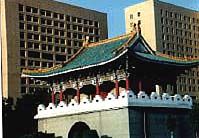 “Society changed,” said writer and activist Shu Yu Shen, 39. “Every group tried to fight for their own rights and have their voice in public. It inspired us.”
“Society changed,” said writer and activist Shu Yu Shen, 39. “Every group tried to fight for their own rights and have their voice in public. It inspired us.”
Although such advocacy might seem wobbly or compromising by Western standards, hampered as it is by still-strong social stigmas, the gay scene in Taiwan also enjoys advantages that Western activists envy.
The most distinct ‘privilege’ in gay Taiwan is the virtual absence of violent gay bashing, but this is not because of any official protections. Three important reasons for this absence are invisibility, ignorance and religion. In the past gays in Taiwan were so invisible as to be phantoms. Prior to 1999 there were no organized festivals or marches, no national ‘agenda’, no political action groups to target. There was an occasional event such as the highly publicized ‘wedding’ in ’96, but few other equal occasions have occurred to equal that singular drama. Until very recently, queers appeared nonexistent which served both to protect them but also to keep them in the closet. Much has changed and LGBT visibility has greatly increased.
Secondly, aggressive homophobia is absent because most people have traditionally known little or nothing about homosexuality; they didn’t know if it was offensive or cool. It’s still a thought-stopping mystery for most working class people. Few could admit to knowing a gay person, and those who did would certainly not disclose it indiscriminately. Even straight sex is hardly talked about among the middle and older generations. Not surprisingly, young people are now more open.
A third reason for the absence is the religious/cultural tradition of Taiwan. Confucianism says nothing about homosexuality. Most of its prescriptions for a good life focus on duty to the state, to one’s family and to maintaining cultural traditions. Absent in these advisories are any anecdotes, metaphors or narratives referencing same sex contact. There is no equivalent to the daunting condemnations which some Christians read into ambiguous passages in Leviticus. A much more relevant issue for local folks here is family honor and continuity. Not getting married and not producing little Taiwanese people can provoke a family crisis.
New Resources and New Life
Any consideration of the ‘new’ gay scene in Taiwan must begin by acknowledging the influence of the Internet. It is clearly a major contributor to the growth and cohesion of the gay community. Indeed, throughout Asia it’s evident that the biggest change has not been in the clubs or bars or activism. More invisibly and much more popular, gays and lesbians are networking in cyberspace and getting a life–chatting, arranging friendships and organizing activities.
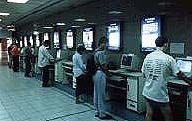 The gay cyber-community in Asia is bursting out of the closet and crowding into chat rooms, bulletin boards, Yahoo/eGroups and specific web pages while keeping a confidential profile if they feel the need.
The gay cyber-community in Asia is bursting out of the closet and crowding into chat rooms, bulletin boards, Yahoo/eGroups and specific web pages while keeping a confidential profile if they feel the need.
One day I went to buy a train ticket at the central station. Adjacent to the ticketing hall was a wide corridor with more than thirty computers glowing in front of thirty mostly-young men and women checking messages and websites. The service was free of charge, compliments of a Taiwanese computer company.
Reporter Chu, of the L.A. Times, quoted Taipei gay businessman Alexander Chang as he claimed, ” cyberspace is a place where you don’t have to reveal your true identity and people don’t know who you are.”
“When Chang left Taiwan to spend a few years overseas,” Chu reported, “one of the only avenues on the island for gays to find one another was a film magazine that carried about a dozen gay personal ads in the back of each issue. The ads were somewhat furtive, couched in cryptic phrases such as “searching for true friends of the same sex. Now, in a sign of how times have changed, Chang’s magazines are gone and LGBT people now crowd the internet and various contact apps with a forthrightness unseen in more conservative Chinese-speaking cultures in the region, from China to Singapore to Malaysia.”
Film ‘Wedding Banquet’: My Life
Politics, festivals, Internet, nightspots, print media and art have all played their part in prying open Taiwan’s conservative lid of tradition to reveal new gay life within.
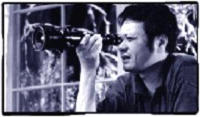 If ‘Birdcage ‘was a sort of fantasy trip for most citizens here, the film that rippled most truthfully through Asia in the past ten years was ‘The Wedding Banquet’, the 1994 story by director Ang Lee (left). It centers on a New York City gay couple, one of whom is Taiwanese and is coerced by his parents (in Taiwan) into marrying a woman. It accurately portrayed the poignant anguish, incongruity and hilarity of Asian heterosexual traditions in a western gay culture. It became Taiwan’s highest-grossing movie and was nominated for an Oscar.
If ‘Birdcage ‘was a sort of fantasy trip for most citizens here, the film that rippled most truthfully through Asia in the past ten years was ‘The Wedding Banquet’, the 1994 story by director Ang Lee (left). It centers on a New York City gay couple, one of whom is Taiwanese and is coerced by his parents (in Taiwan) into marrying a woman. It accurately portrayed the poignant anguish, incongruity and hilarity of Asian heterosexual traditions in a western gay culture. It became Taiwan’s highest-grossing movie and was nominated for an Oscar.
Virtually every Asian gay man I’ve spoken to has seen this film and claimed it was his story, although none of the men thought that a typical Chinese father would be as aware and open-minded as the one portrayed in the movie (he sympathetically understands the bond between his son and his ‘friend’). Joseph and Michael agreed that the film was the best portrayal to date of a gay Chinese character and the pressures he feels from home. They also thought the movie had a strong and positive impact in helping gay Taiwanese come out.
Also in 1994, an important early breakthrough book by Chu T’ien-wen was the acclaimed novel ‘Notes of a Desolate Man’. It won one of Taiwan’s most distinguished literary awards, the China Times Novel Prize. The fictitious but real story recounts of the anguished life and deeply felt loves of a gay narrator.
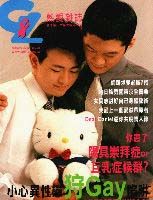 Later, Michael said, a famous native pop singer felt the time was right to come out. Although he doubted this was connected with the film’s debut, he thought the publicity and subsequent stories surrounding the singer had helped loosen up people’s attitudes a little more.
Later, Michael said, a famous native pop singer felt the time was right to come out. Although he doubted this was connected with the film’s debut, he thought the publicity and subsequent stories surrounding the singer had helped loosen up people’s attitudes a little more.
Then in November 1996, a lot of notoriety was focused on the gay wedding between the writer/activist Shu Yu Shen and his western partner, Gray Harriman. The happy couple smiled for the photographers and reporters who packed the ballroom, along with 300 friends and supporters, as witnesses to the unique event. It was a festive and colorful ceremony that made mildly shocking headlines in Taiwan and other parts of the world.
One witness reported, “Shu, an author, got up on stage beneath a rainbow flag and gave an emotional speech. ‘I’m just a representative for all gays and lesbians in Taiwan,’ he told the crowd. ‘I know many gay and lesbian couples who cannot get married and have the blessing of their friends.’ It was a watershed moment for Taiwan’s hesitant gay movement.
Such precedent events from the 90s and into the 2000s have given the LGBT movement a forward thrust that cannot be reversed.
Gay Nights
Less dramatic yet more persistently, Taipei’s gay life has extended to include a dozen mixed or men’s bars and clubs, a gay sauna or two, and cruising in 28 February Park. This latter green patch of trees, fountains and flowers is a quiet and active respite from the honking and buzzing of Taipei’s busy streets.
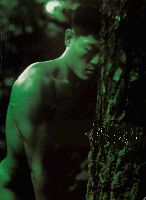 During the day New Park is alive with elders doing tai-chi exercises, strolling mothers with yelping kids, lunch hour workers hovering over their chopsticks. Friends and neighbors also come to stroll, read, chat, or soak up a little sun and enjoy the huge cubist water fountain that dominates the park.
During the day New Park is alive with elders doing tai-chi exercises, strolling mothers with yelping kids, lunch hour workers hovering over their chopsticks. Friends and neighbors also come to stroll, read, chat, or soak up a little sun and enjoy the huge cubist water fountain that dominates the park.
Toward nightfall, the scene distinctly shifts. (Even the Lonely Planet guide acknowledges: ” It’s fairly important to know that New Park takes on a totally different character at night…”) Although the city government has recently installed more lighting and trimmed the bushes, New Park continues to be a major attraction for anonymous connections. Some folks go there just to watch or are more interested in the social scene.
For newcomers who do not know the more private venues or who are just coming out, the scene is a learning playground. Of course there are always a certain number of attendees who are forcibly married gays and use the park nervously for their only physical contact with men.
A few blocks away, and scattered around town, there are gay bars and clubs that change names and location from year to year. Of course there are the expected gay saunas some of which double as gyms and there are discos that thrive seven days a week. Needless to say these venues change from time to time so it’s important to check the internet for the most recent action.
Future Shock and Hope
So the scene is alive in Taipei with its blend of Old World paranoia, New World style and youthful boldness. The shift is unusual for an Asian culture that has been history-bound in tight traditions. The gay ‘wave’ is moving forward in the wake of commercial success that’s penetrating the bamboo curtain with humanistic and technological innovation.
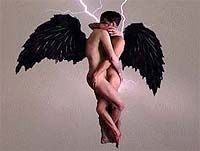 The hope here is captured in the courage of couples like Michael and Joseph who are not content with bumping darkly into each other. Rather, they have declared their commitment to each other and are willing to accept the struggle of discovery in their homeland.
The hope here is captured in the courage of couples like Michael and Joseph who are not content with bumping darkly into each other. Rather, they have declared their commitment to each other and are willing to accept the struggle of discovery in their homeland.
Although he has only been out for three years, Michael says, “the sex may be new for me, but my heart is old. I came out slowly because I wanted to be sure what I wanted. Now I know, and I’m optimistic to make this work for us.”
For his part, Joseph is more cautious, having been in a relationship before. But he clearly says that “nothing could make me go away from Michael–not my family, not my society.” Despite his lament about the lack of social support for their relationship and the scarcity of long-term role models, these two threshold lovers are determined to move ahead with the times and their love. “Even with the fear of China, we can insist on a good quality of life. This is Taiwan!”
Also see:
Gay Taiwan Stories
Gay Taiwan News & Reports 2000 to present
Gay Taiwan Photo Gallery

